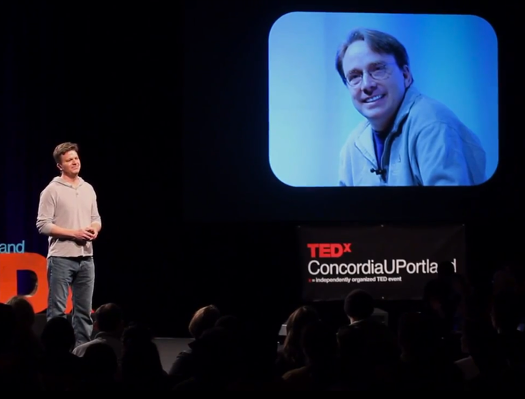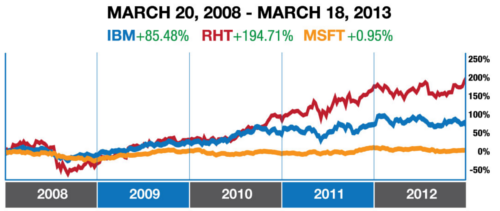What has the IT industry learned from Linus Torvalds?
- Transfer

Jim Zemlin, executive director of the Linux Foundation, is probably one of the few people who were in the thick of things with the advent and development of Linux, the largest collaborative development in the history of computing. He understands that the speed of innovation and the quality of software development is dictated by those who look forward and work in collaboration with each other. That's why he was invited to the recent TEDx, with a story about what the IT industry has learned from Linuh and especially from the founder of this project, Linus Torvalds .
Linux development is an amazingly successful project, and TEDx visitors wanted to hear about how such success could be achieved and how they could apply the experience of the Linux community in their work. Jim, in his typical style, spoke about the lessons they learned in the course of their work.
These lessons turned out to be a little unexpected at first glance, but after Jim explained each of them, TEDx students understood more clearly what made Linux the most widely used technology in human history. Today, Linux is used in the Internet, our smartphones, televisions, the most high-performance computing systems and on eight of the ten largest world exchanges. “This is literally the foundation for our global economy,” he explained.
Jim explains the success of Linux in his speech with four basic principles:
Do not “roll your lip”
Jim Zemlin quoted David Frost: “Do not set your goal to succeed. Just do what you love and believe in your business, then success will come to you. ” This is exactly what Linus Torvalds did when he posted the first version of the Linux kernel on the Internet in 1991. He did not think that this project should become something big, he just did what he liked.
Share with others
Jim Zemlin made an important point about the fact that many companies make money with software that is available for free. By sharing the results of his work with others, Linus Torvalds and the entire Linux community have created more value than even the largest companies can develop on their own.
Today, development costs comparable in scale to the Linux kernel are estimated at more than $ 10 billion. Companies involved in Linux development, such as IBM and Red Hat, continue to see rising stock prices, while companies that use mostly closed development models do not see an influx of new shareholders.

Jim Zemlin said that even Apple benefits from Linux and Open Source. Every iPhone and iPad has free software. He said: “Apple knows something that many people are unaware of. When you stand on the shoulders of giants, you can get innovation at a higher level. ”
A plan is not always needed.
He continued the story by saying that the Linux development plan is “the lack of a development plan” and explained that the development community decides on its own what needs to be done. This is faster and more consistent. There are seven commits every hour on Linux, 24 hours a day, because people do what they themselves lack for their tasks.
Sometimes you can be rude.
The last principle is perhaps the most interesting and provocative. Jim talks about the value of arguing, upholding his ideas, and making fun of bad code. What's the point? As a result, we all get high-quality software. He refers to a study at the University of Berkeley, where they found that groups that were asked to criticize others and defend their ideas came up with better solutions than groups that used traditional brainstorming sessions, where each idea is a good idea.
In general, Jim's speech is centered around a simple thought - you can make money while sharing the fruits of your labor with others. Surprisingly, if each of us gives a little to the general “technological piggy bank”, then we will all become richer.
Here is the full video of the speech.
UPD: A post appeared in the hub with the translation and in the voice acting of this video.
